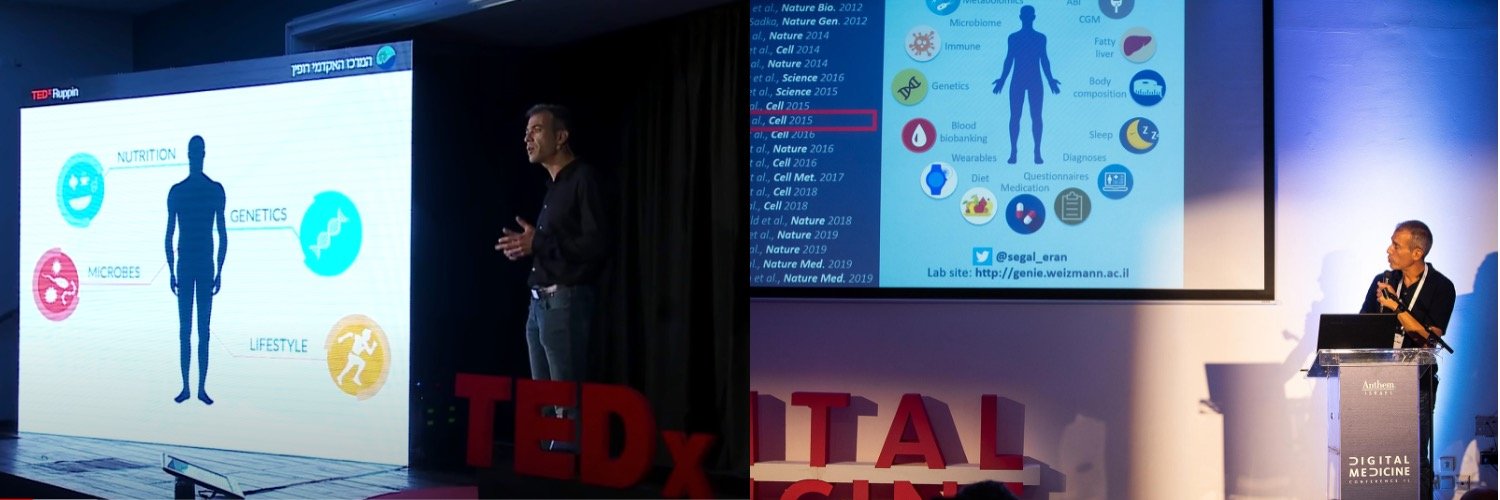
Eran Segal
@segal_eran
Scientist at the Weizmann Institute. Microbiome, Genetics, Nutrition, Machine learning. Marathon runner (2h 56m)
In the Human Phenotype Project, home sleep apnea testing data was collected for a total of 16,812 nights in 6,410 individuals, allowing for a comprehensive study of the association of sleep traits with physiological features across 16 body systems. nature.com/articles/s4159…
A description of the Human Phenotype Project (HPP), a growing dataset of >13,000 participants (already 28,000 have provided consent for enrollment) that aims at dynamic multi-modal deep phenotyping to better understand health & disease risk👇
On the most extensive biologic and physiologic characterization of humans (aka deep phenotyping) to date, the Human Phenotype Project @segal_eran @smadarshilo @Lee_Reicher1 @ericxing @WeizmannScience @NatureMedicine nature.com/articles/s4159…
An increasing number of papers is emerging from the Human Phenotype Project. 👉It is a very rich dataset with serial deep phenotyping assessments for 10,000 participants 👉Latest paper explores associatons of 448 sleep traits from apnea test monitoring with other phenotypes.
התוצאה אכן קשה מאד, המימון הכללי ירד, זה מורגש, וכבר פוגע בתפוקה המדעית המדינה אכן חייבת לפצות, ובמהרה
הסיבה לא ידועה. חרם? או אולי ההצעות באמת פחות טובות בגלל מילואים או קשיי המלחמה? לא משנה הסיבה, התוצאה קשה מאד. בזכות המדע יש לנו כלכלה, בריאות, ביטחון, היי טק. כדי שנמשיך להוביל המדינה חייבת לפצות ולתמוך במחקר ישירות.
Excited to share a milestone published in @NatureMedicine from our decade-long effort to build The Human Phenotype Project, a unique longitudinal cohort with unmatched depth of clinical and multi-omic profiling, enabling truly predictive, personalized medicine. Led together with…

Meet your digital twin: Using the massive database of the Human Phenotype Project, researchers from Prof. @segal_eran’s lab at the Weizmann Institute aim to predict disease before it strikes - and hopefully delay or even prevent it >>bit.ly/AI-twin-Eng
Rebuilding the lab, one step at a time Today we returned to profile participants in our Human Phenotype Project cohort 💪 humanphenotypeproject.org
Our lab at the Weizmann Institute was hit tonight by Iran We will rebuild and return 💪
Our lab at the Weizmann Institute was hit tonight by Iran We will rebuild and return 💪



In a new arxiv paper, we show that certain conditions like sleep apnea can be predicted from just 30-second voice recordings of adults counting, suggesting that voice may be a disease screening biomarker We used embeddings learned from a foundation AI model for speaker…

An impressive sleep study goes deep on links to lifestyle and diseases —impact of gut microbiome and diet re: sleep apnea —big contribution of lifestyle factors —ability to predict across 16 body systems from sleep data @NatureMedicine @segal_eran @WeizmannScience…
We have a new and revised GluFormer manuscript! We expanded our analyses considerably: now showing that our AI model for CGM can identify individuals at higher risk of declining glycemic control before it happens, and can predict long-term diabetes & cardiovascular mortality.
Welcome to the new world
O3's estimated IQ is 157. It is smarter than 99.25% of people.
.@segal_eran & colleagues built 14 "biological clocks" representing the biological age and rate of aging of 14 major body systems using data from 13,000 people. Species abundance in the microbiome is a variable considered into aging models: nature.com/articles/s4358…
“Biological clocks are clinically meaningful” @segal_eran
Our new @NatureAging paper: We built 14 "biological clocks" representing the biological age and rate of aging of 14 major body systems using data from 13,000 people of the Human Phenotype Project Key findings: 1. Biological clocks are clinically meaningful: People with higher…
A new report on biological aging from the Human Phenotype Project with key insights on age-related diseases and gender-specific effects @NatureAging @WeizmannScience
Our new @NatureAging paper: We built 14 "biological clocks" representing the biological age and rate of aging of 14 major body systems using data from 13,000 people of the Human Phenotype Project Key findings: 1. Biological clocks are clinically meaningful: People with higher…
This is a very interesting and informative paper on aging, with striking insights into biological clocks across different systems and between men and women.
Our new @NatureAging paper: We built 14 "biological clocks" representing the biological age and rate of aging of 14 major body systems using data from 13,000 people of the Human Phenotype Project Key findings: 1. Biological clocks are clinically meaningful: People with higher…
Our new @NatureAging paper: We built 14 "biological clocks" representing the biological age and rate of aging of 14 major body systems using data from 13,000 people of the Human Phenotype Project Key findings: 1. Biological clocks are clinically meaningful: People with higher…

🎉 Thrilled to share that my latest paper (w/ @segal_eran) on the gut microbiome's role in host metabolic health has just been published in @NatureComms! Dive into our insights📄✨ nature.com/articles/s4146… 1/5
